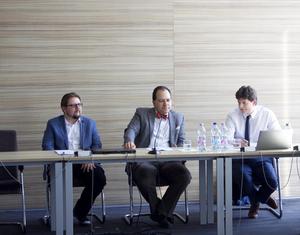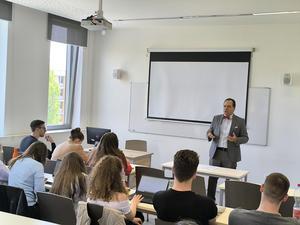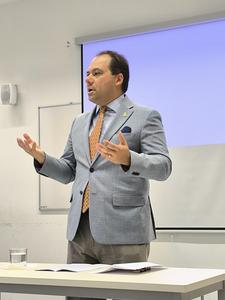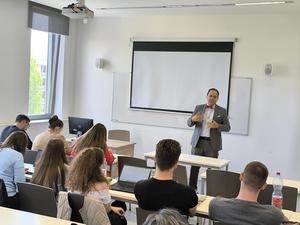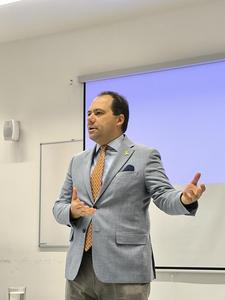The students of the Faculty of Public Governance and International Studies had the opportunity to participate in an exciting and valuable intellectual journey by following the lectures of the guest professor, Ilya Shapiro. As the Director of Constitutional Studies at the Manhattan Institute in the United States, Shapiro aimed to engage students in collective thinking with various intriguing topics ranging from the politicisation of the United States Supreme Court, controversies surrounding the presidential elections, freedom of speech issues, challenges facing American higher education, to the impending challenges of the American federal administration.
With extensive academic and international experience, Professor Shapiro visited the Faculty as part of the Ludovika Fellowship Programme. On April 10th, with the support of Bernát Török, the head of the Eötvös József Research Centre at the University, he delivered a lecture titled "The New Supreme Court and the Politics of Judicial Appointments" to the students of the International Public Management BA program. During the lecture, students embarked on a temporal and spatial journey, learning about the historical traditions of nominating and appointing judges to the Supreme Court. This was followed by a systemic analysis of the decisions made by the Court and how the perceived or actual ideological divisions (conservative/liberal) influenced or did not influence the judicial decisions. The lecture also highlighted the increasing politicisation of court decisions in contemporary times, primarily correlated with the general political climate.
On April 11th, Shapiro gave a lecture titled "The American Presidency and the 2024 Elections" to the students of International Studies MA program. He not only attempted to illustrate the functioning of the electoral system but also analysed the perceptions of the two dominant candidates based on recent opinion polls. He emphasised that American voters face two candidates they consider less than ideal for the presidency: Three in ten American adults believe neither would make a good president. Under normal circumstances, the election campaign would allow candidates to strengthen their image. However, Biden and Trump have well-established images, but neither was popular during their presidency. In a polarised political environment where negative partisanship determines voting behaviour - preferring to vote against the other person or party rather than for anyone - the manoeuvring space is thin. Last-minute surprises could determine the outcome of the competition.
In addition to meeting with students, Ilya Shapiro engaged the teaching staff of the Faculty in a separate professional exchange. In an informal workshop, accompanied by Dr Lénárd Sándor, the head of the International Law Workshop at the Mathias Corvinus Collegium, he discussed the academic freedom, the crisis in higher education, and the current situation of American universities. He pointed out that we can observe the disruption of the fundamental mission of universities, the pursuit of truth and the advancement of human knowledge, as well as the undermining of classical liberal values such as freedom of speech, fair procedures, and equality before the law in the United States today.
Shapiro also introduced the topic to the International Public Service Relations students in a separate lecture, details of which are available on the university's website.
During his last lecture in Budapest, Shapiro met with the students of the Public Administration Manager Bachelor's program. Via the special lecture titled "Challenges and Changes in Administrative State", he introduced them to the volatile world of the administrative and federal law system of the United States. He delved into how the federal system works in the States, with particular focus on the challenges faced by administrative decision-making, rulemaking, and oversight as dictated by administrative procedure law. He emphasised the issue of independent agencies, particularly the problem that has long challenged the administrative system: Although, individual federal agencies are located within a government branch (judicial, legislative, or executive), their jurisdiction often extends to the functions of other branches. Without careful regulation, this can lead to unchecked power within a specific government area, violating the separation of powers.
Text: International Department of FPGIS
Photos: András Szabó, Dénes Szilágyi
